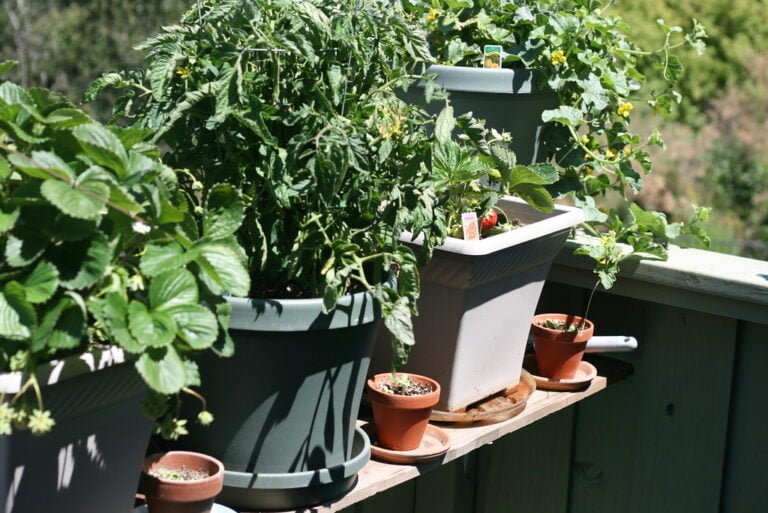The Benefits of Companion Planting With Mint
Discover the incredible benefits of companion planting with mint. By incorporating this aromatic herb into your garden, you can naturally control pests, enhance flavor, and increase your yield. Mint acts as a natural weed deterrent and attracts beneficial insects that help your plants thrive. Additionally, it enriches the soil, keeping it fertile for your vegetables and herbs. Get ready to enjoy the practical advantages of planting mint as it serves you and your garden in more ways than one.
Pest Control
To control pests in your garden, consider companion planting with mint. Mint is not only a fragrant and flavorful herb, but it also has natural pest-repellent properties. By planting mint alongside your other crops, you can help protect them from common garden pests such as aphids, ants, and cabbage moths. The strong scent of mint acts as a natural deterrent, keeping these unwanted visitors at bay. Mint also attracts beneficial insects like bees and predatory wasps, which help to maintain a healthy ecosystem in your garden. To maximize the benefits of companion planting with mint, make sure to plant it strategically throughout your garden, rather than in one concentrated area. This will help to create a barrier of protection and ensure that pests are kept at a distance from your precious crops.
Improved Flavor
By planting mint alongside your crops, you can enhance their flavor and add a refreshing twist to your dishes. Mint has a distinct aroma and taste that complements a variety of foods, making it a versatile herb to have in your garden. When grown near vegetables like tomatoes, the mint leaves release essential oils that infuse the vegetables with their unique flavor. This can elevate the taste of your dishes, giving them a fresh and vibrant touch. Mint also pairs well with fruits, such as strawberries or watermelon, adding a cooling and aromatic element to your desserts. Additionally, you can use mint leaves to make flavorful teas or infused water, providing a refreshing beverage option. So, why not give companion planting with mint a try and elevate the flavor profile of your home-cooked meals?
Increased Yield
When planting mint alongside your crops, you can expect an increase in yield. Mint is known to release compounds that repel pests like aphids, beetles, and ants, which can damage your plants and reduce their productivity. By warding off these pests, mint helps your crops grow healthier and stronger, resulting in a higher yield. Additionally, mint has a shallow root system that doesn't compete heavily with other plants for nutrients and water. This means that when you plant mint alongside your crops, it won't steal valuable resources from them, allowing your crops to flourish and produce more. The aromatic oils released by mint can also attract beneficial insects like bees and butterflies, which aid in pollination, further enhancing your yield. So, consider companion planting with mint to boost your crop production.
Natural Weed Control
One benefit of companion planting with mint is its natural weed control capabilities. Mint plants release a strong aroma that repels many common garden weeds, reducing the need for manual weeding or the use of chemical herbicides. When planted as a companion, mint acts as a natural deterrent, preventing weeds from taking over your garden and competing with your desired plants for resources. The strong scent emitted by mint disrupts the growth and development of weed seeds, inhibiting their germination and growth. Additionally, the dense foliage of mint plants shades the soil, preventing sunlight from reaching weed seeds and hindering their ability to sprout. By incorporating mint into your garden, you can minimize weed infestations and maintain a cleaner, more productive growing environment.
Attracts Beneficial Insects
Mint plants attract beneficial insects to your garden, helping to promote a healthy and balanced ecosystem. These insects play a crucial role in controlling pests, pollinating flowers, and improving soil quality. By attracting beneficial insects, you can reduce the need for chemical pesticides and create a more sustainable and natural gardening environment.
One of the key beneficial insects that mint attracts is the ladybug, also known as the gardener's best friend. Ladybugs feed on aphids, mites, and other harmful pests that can damage your plants. By having a population of ladybugs in your garden, you can effectively control pest outbreaks without resorting to harmful chemicals.
In addition to ladybugs, mint also attracts bees and butterflies, which are essential for pollination. These insects help to transfer pollen from one flower to another, ensuring the production of fruits and seeds. Without pollinators, many plants would struggle to reproduce and thrive.
Mint's strong aroma also repels some pests, such as ants and aphids, further protecting your garden from infestations. Additionally, the mint plant itself can act as a trap crop, luring pests away from your other plants and preventing them from causing significant damage.
To attract beneficial insects to your garden, consider planting mint near other susceptible plants. Place it strategically throughout your garden to create an inviting environment for these helpful creatures. By doing so, you can enjoy the benefits of a thriving garden while minimizing the need for harmful pesticides and contributing to a healthier ecosystem.
Repels Harmful Insects
To effectively repel harmful insects in your garden, consider companion planting with mint. Mint, with its strong scent, acts as a natural deterrent for a variety of pests. Planting mint near susceptible plants can help keep aphids, ants, fleas, and even rodents at bay. The volatile oils released by mint plants act as a natural insect repellent, disrupting the pests' sense of smell and making it difficult for them to locate their target plants. Mint is particularly effective against cabbage worms, squash bugs, and whiteflies. Simply interplant mint with your vegetables or herbs to create a protective barrier. Be cautious, though, as mint can be invasive. To prevent it from taking over your garden, consider planting it in containers or using a root barrier. By incorporating mint into your companion planting strategy, you can naturally repel harmful insects and protect your garden.
Enhances Soil Fertility
Planting mint as a companion in your garden can improve soil fertility. Mint is known for its ability to accumulate nutrients from the soil and release them back into the surrounding area as it decomposes. This process, known as nutrient cycling, helps to replenish the soil with essential elements necessary for plant growth. Mint also has a deep root system that helps to break up compacted soil, allowing for better water infiltration and root penetration. Additionally, mint releases compounds into the soil that can suppress the growth of weeds and inhibit the development of harmful pathogens. By planting mint alongside your other crops, you can create a more balanced and fertile soil environment, leading to healthier plants and increased yields.
Deters Common Garden Pests
Are you struggling with pesky garden pests? If so, companion planting with mint could be the solution you've been looking for. Mint is known for its strong scent, which acts as a natural deterrent for many common garden pests. The fragrance of mint is particularly effective against insects like ants, aphids, and mosquitoes. By planting mint alongside your other vegetables or flowers, you can create a natural barrier that helps to keep these pests away. Not only does mint repel insects, but it also attracts beneficial insects like bees and butterflies, which can help with pollination. This natural pest control method is not only effective but also safe for both you and the environment. So why not give companion planting with mint a try and say goodbye to those pesky garden pests?
Companion for Vegetables and Herbs
If you're growing vegetables or herbs, companion planting with mint can provide numerous benefits. Mint is a versatile plant that can work well with a variety of vegetables and herbs in your garden. One of the main advantages of planting mint alongside your vegetables and herbs is that it can help deter pests. Mint has a strong scent that can repel many common garden pests, such as aphids, cabbage moths, and ants. This can help protect your crops from being damaged or destroyed by these pesky critters. Additionally, mint can attract beneficial insects, such as bees and butterflies, which can help with pollination. Overall, companion planting with mint can be a practical and effective way to support the growth and health of your vegetables and herbs.
Provides Aromatic Scent
When companion planting with mint, you will discover that it provides an aromatic scent that can enhance the overall ambiance of your garden. Mint plants release a refreshing fragrance that can uplift your mood and create a pleasant environment. The strong scent of mint acts as a natural deterrent for pests, helping to keep your garden free from unwanted insects. Additionally, the aromatic scent of mint can attract beneficial pollinators like bees and butterflies, which are essential for the pollination of flowers and the growth of fruits and vegetables. By planting mint as a companion in your garden, you not only enjoy the delightful scent but also support a healthy ecosystem. The aromatic properties of mint make it a valuable addition to any garden space.
Conclusion
In conclusion, companion planting with mint brings numerous benefits to your garden. Not only does it help control pests and weeds, but it also enhances the flavor and yield of your vegetables and herbs. Additionally, mint attracts beneficial insects and improves soil fertility. With its aromatic scent and ability to deter common garden pests, mint is a valuable companion for any gardener. So why not give it a try and enjoy the practical advantages of companion planting with mint?






